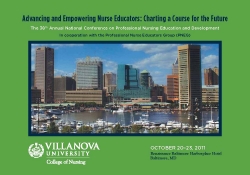Villanova Nursing CE hosts another successful educator conference

The Continuing Education (CE) program is an important program of the College of Nursing offering local, regional and national conferences for nurses and interested health care professionals. The CE staff recently hosted another successful educator conference in Baltimore, October 20-23. Drawing 250 attendees from 36 states plus Canada and Singapore, Advancing and Empowering Nurse Educators: Charting a Course for the Future-- The 38th Annual National Conference on Professional Nursing Education and Development was offered in cooperation with the Professional Nurse Educators Group (PNEG). In addition to hosting the 2011 conference, the CE program also hosted 2009 and will host 2012 in Philadelphia.
The conference has served as a prominent vehicle for professional nursing educators in academic, entrepreneurial, continuing education and staff development positions to strengthen their roles through learning, sharing and networking. Villanova Nursing’s faculty and doctoral students and alumni shared their expertise; among them were podium and poster presenters.
Presentations
Elizabeth Blunt, PhD, CRNP
· Status of Disability Content in Graduate Nursing Education
· (Panel) Bringing Standardized Patients into Academia: An Innovative Approach to Standardized Patient Recruitment
Ruth Crothers, PhD, RN, GCNS-BC, CNOR (PhD alumna)
· The History of Organized Continuing Nursing Education 1957-1974:backdrop to Future Directions
Marcia Costello, PhD, RD, LDN, assistant professor and Denice Ferko-Adams, MPH, RD, LDN, director, MacDonald Center for Obesity Prevention and Education
· The Biggest Winner: Obesity Prevention Education for Nurses
Karen Goldschmidt, MSN, RN (PhD student)
· With a Little Help from my Friends…The Educator’s Role in Effective Student Study Groups
Tamara Kear, PhD, RN, assistant professor
· Exploring the Benefits of Collaboration between the Clinical Educator & Coordinator of Clinical Faculty
Maryanne Lieb, MSN, RN, clinical assistant professor and coordinator, second degree options
· Good Things Can Happen to Mediocre Cooks
Karen May, MSN, RN (PhD student)
· Exploring the Relationship of Genomics and Environmental Health with Senior Baccalaureate Nursing Students
Nancy Sharts-Hopko, PhD, RN, FAAN, professor and director, PhD in Nursing Program
· Bringing Nursing Research to Life with Undergraduate Students
Suzanne Smeltzer, EdD, RN, FAAN, professor and director, Center for Nursing Research
· Status of Disability Content in Graduate Nursing Education Programs
Catherine Todd Magel, EdD, RN BC, assistant professor
· Collaborative Learning Promotes Collegiality
Carol Toussie Weingarten, PhD, RN, ANEF, associate professor
· Working Smarter: Re-Envisioning Faculty Roles to Meet Challenges in Nursing Education
Anne Vitale, PhD, RN (PhD alumna)
· The Use of a Distance Learning Mentoring Program to Assist Novice Nurse Educators
Posters
Mary Ann Cantrell, PhD, RN, assistant professor and Bette Mariani, PhD, RN, assistant professor
· The Role of Structured Debriefing on Students Clinical Judgment Abilities in Simulation
Tamara Kear, PhD, RN, assistant professor
· Cross-Disciplinary Learning Experiences: Implications for Nursing Education
Elizabeth Romeo, PhD, CRNP, FNP-BC (PhD alumna)
· The Predictive Ability of Critical Thinking, Nursing GPA and SAT Scores on First Time NCLEX-RN Performance
Lorraine Rusch, PhD, RN (PhD alumna)
· Exploring Baccalaureate Nursing Students Experiences with Clinical Preparation, Clinical Reasoning, and Decision Making
· Preceptor Perceptions of Student Readiness for Preceptorship: A Curriculum Evaluation Modality
Jennifer Ross, PhD, RN, CNE, adjunct clinical instructor
· The Effect of Simulation Training on Baccalaureate Nursing Students Competency in Performing Intramuscular Injection
Catherine Todd Magel, EdD, RN BC, assistant professor
· Curriculum Development
Carol Toussie Weingarten, PhD, RN, ANEF, associate professor
· Low Cost, High Impact Simulation for Leadership and Professional Development in Undergraduate Nursing Education: Achieving Essential Outcomes Through the Student Nurses' Association
